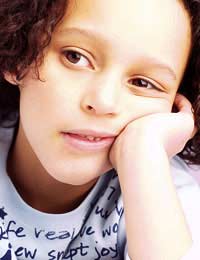Headaches in Children

Like adults many children suffer from headaches and in fact, the causes are sometimes the same as those experienced by adults. Other headaches are more specific to children and may also require very different treatment approaches to manage the pain.
Most headaches occurring in children are fortunately benign and do not indicate a serious disease. Many adults begin experiencing headaches during childhood so it is particularly important to address the headaches when they first begin. Headaches such as migraines are genetically linked and so may occur in more than one family member.
Types of Headaches in Children
It can be quite difficult for children to describe headaches in detail and this can make diagnosis and treatment challenging for doctors and parents. In general, there are primary headaches, which develop by themselves and where the causes are not typically known and secondary headaches, which develop from an underlying illness or injury. Primary headaches include migraines, tension headaches and cluster headaches.Migraine
Children who experience migraines often do so based on genetics. During a migraine, blood vessels constrict or dilate. Migraine symptoms resulting from these vascular changes include problems with vision and balance as well as nausea, vomiting, dizziness and pain.Tension Headache
Most children's headaches are tension ones, and are due to issues such as stress, poor sleep patterns, food and food additives or environmental triggers. A small percentage of children suffering from tension headaches will develop chronic headaches, which occur on a daily or near daily basis.
Cluster Headache
These are uncommon in children but are often extremely painful. They involve pain on one side of the head. Because they are quite sharp and cause a great deal of discomfort, they can be disabling and disruptive to the child's functioning in school if occurring on a regular basis.Secondary Headaches, Prompted by an Underlying Injury Include:
- Head injury
- Concussion
- Viral infection such as meningitis
- Bacterial infections
- Medication side effects
- Sinus disease
- Tumours
Treating Headaches in Children
Treating a child's headaches involves both prevention strategies and treatment for theheadache itself. It is important to ensure the child receives enough sleep each night and that water intake is adequate.Obtaining enough fluids from foods and beverages will help to prevent dehydration, which can lead to headaches. A headache diary might be useful to determine when headaches are occurring; this can aid in narrowing down a trigger such as a particular food or an environmental factor.
Also be sure that your child eats healthy meals regularly as low blood sugar can prompt a headache. Providing additional nutritious snacks throughout the day can help to maintain a more consistent blood sugar.
Try to help your child avoid stressors whenever possible. Some are inevitable, such as exams, but working with your child to develop ways to cope can help to prevent headaches.
Counselling may be helpful if your child's headaches are triggered by emotional reactions to stress. For relief of immediate headache symptoms, over-the-counter medications such as acetominophen and ibuprofen are often effective. They also lower fevers and are therefore particularly helpful if your child's headache is fever related. Prescription medications are more likely to be prescribed for a child who experiences migraines. These may include ergotamine, triptan medications, antidepressants and calcium channel blockers. Any treatment of a secondary headache will involve treatment of the underlying illness or disorder.
It can be difficult for children to articulate their discomfort when headache pain strikes, particularly toddlers, but with careful attention and preventative measures in conjunction with any advice from a physician, your kids can handle headaches better. For a kid, fewer headaches means more time doing what kids do best: playing.
- Head Injury: Signs That There Could Be Brain Damage
- Adolescents and Headaches
- Fibromyalgia and Chronic Headaches
- Headaches and Iron Deficiency
- Thyroid Disease and Headaches
- Headaches and Migraines in Women
- Vertigo and Migraines
- Epileptic Attacks and Migraine
- Headaches in People Over 50
- Headache and Migraine Relief During Pregnancy
- Migraines and Menopause


Re: Migraines and Menopause
I have at 51yrs, only recently found out (thro' blood test) I am going thro' the menopause And just recently started with bad migraines…
Re: Headache With Pins and Needles: Is This Serious?
I’ve had a headache for the past 3 days however I am on my period so didn’t think anything of it however…
Re: Migraines and Menopause
I suffered horrid migraines in my teenage years, which re-appeared when I was 40.... now 54 and having developed all symptoms of…
Re: Flicker Illness
This is first time I have researched a condition that I have developed in only the last four years, and as of this date am fifty four years old. I…
Re: Migraines and Menopause
I started with headaches from about March this year all down in the back of my neck and across the front of my head. I’ve had one period…
Re: Migraines and Menopause
Hello I am going through early menopause I’m only 38 and have been feeling unwell for six months doctor has put me on HRT but I have been…
Re: The Cost of Headaches in the UK
I have had constant headaches for about 4 weeks. I have been to the opticians but everything is fine. My GP is not concerned…
Re: Migraines and Menopause
I've been suffering with headaches for 8 months now. My last period was march this year. The headaches are as follows tightness around…
Re: Migraines and Menopause
Im really grateful to have found this page. A few months back I had a thunderclap headache and was rushed to ED for all the usual tests.…
Re: Scalp Pain: What Causes It?
I cannot consume any additives, preservatives or dyes. Today I ate about a tsp of the potato salad I made for a picnic. It had…